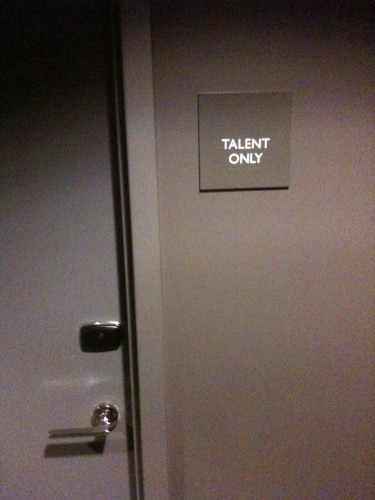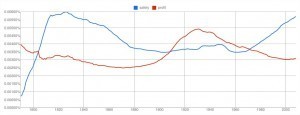Daniel H. Pink's Blog, page 18
February 17, 2011
Are you ready for world domination?
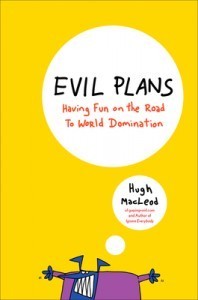 Hugh McLeod of Gaping Void has a terrific new book out today, all about how to develop your very own evil plan. Seriously. It's called — natch – Evil Plans: Having Fun on the Road to World Dominion. (Buy it at Amazon, Barnes & Noble, or Penguin.)
Hugh McLeod of Gaping Void has a terrific new book out today, all about how to develop your very own evil plan. Seriously. It's called — natch – Evil Plans: Having Fun on the Road to World Dominion. (Buy it at Amazon, Barnes & Noble, or Penguin.)
We're thrilled that Hugh provided us with this excerpt, exclusively for Pink blog readers. Enjoy!
Sleep Rough
Fortune rarely favors those with a sense of entitlement.
IT WAS SPRING, IN MY HOMETOWN OF ALPINE, Texas. I was drinking a beer at the Railroad Blues, as I often did. Instead of the usual blues, country, and "American roots" bands they were used to having, the group playing that evening was a young indie/power pop/alternative group from Limerick, Ireland, called "We Should Be Dead." Female lead singer and female lead guitar, male drummer and male bass. Average age, I'd say, was around twenty-four.
Now, Celtic indie/power pop/alternative is not exactly the kind of music I'm into (Louis Armstrong and Beethoven are more my cup of tea). But man, I was so impressed with these kids. They totally played their hearts out. Not to mention, there were a lot of cowboys and shit-kickers in the crowd that evening—not a group you'd want to tick off. Everyone—including the cowboys and shit-kickers—were impressed by how gutsy and fearless these kids were.
The lead singer, Tara—a tiny, skinny girl around five-two, would get off the stage in the middle of a number and walk around the crowd, singing full-blast into her mike, with these broad-shouldered cowboys wearing handlebar mustaches, ten-gallon hats, spurs, and boots, towering above her. Like I said, fearless. So even if the music was a bit alien compared with what people were normally used to, they still got a lot of people whoopin' and a'hollerin' that night. It was a great show. Months later, people were still talking about it.
I got talking to their manager—a stocky, Irish dude in his forties. It turns out, though they were now on tour, they hadn't planned it that way. They had originally only come over for the big music festival in Austin, Texas—South by Southwest—and were planning to return to Ireland right afterward.
Then somehow while at SXSW the manager made some new connections, and the next thing you know, the band was headed west to California, ready and willing to play in every dive bar and dance hall en route that would let them—sometimes only for tips. Buying an old van; throwing their instruments, amplifiers, and sleeping bags in the back; living on a few bucks a day plus gas money; sleeping rough if they had to.
And they were going to keep on doing it till they had spent their last nickel, till they had burned their last drop of gas. Only then, and not before, would they fly back home.
Sure, they could have gone back to Ireland after SXSW instead and continued being a regular fixture around the local pub 'n' club circuit. But they wanted to bust out of that routine—and here was their chance. Not a huge chance, but a chance nonetheless. And they were going for it, no questions asked. Like Anna, the equally tiny-skinny lead guitarist told me in her cute little Limerick accent, "We don't want to go home. We want to keep doing this forever."
Would you be willing to put in that kind of effort and commitment to make your Evil Plan a success? How willing to "sleep rough" are you? Are you that brave? Am I?
FOLLOW-UP: A couple of years later, at the time of this book going to print, I am happy to report that We Should Be Dead is still in America, playing mostly around Los Angeles and keeping really busy. God bless 'em! . . .
Adapted from Evil Plans by Hugh MacLeod by arrangement with Portfolio Penguin, a member of Penguin Group (USA), Inc., Copyright © 2011 by Hugh MacLeod.
February 11, 2011
Emotionally intelligent signage in Green Bay Packer country
Rod Johnson sends this example of emotionally intelligent, which he spotted "while driving up to the Wild Rice Restaurant in Bayfield, Wisconsin."
February 10, 2011
Can a 5-minute exercise double your productivity?
 Yeah, I know. It sounds like a spammy Internet come-on – a proposition too good to be true. But in this month's Sunday Telegraph column, I look at the work of University of Pennsylvania management scholar Adam Grant – and his research on using purpose and significance as performance-enhancing drugs.
Yeah, I know. It sounds like a spammy Internet come-on – a proposition too good to be true. But in this month's Sunday Telegraph column, I look at the work of University of Pennsylvania management scholar Adam Grant – and his research on using purpose and significance as performance-enhancing drugs.
His finding: Reminding people why they're doing what they're doing – even in surprisingly modest ways — can have a big impact.
You can read the full column here.
February 4, 2011
Pencil as Power Tool
 A few years ago, I took a five-day drawing class in New York City that changed my life. I entered the class a complete ignoramus on matters visual. By week's end, I was somewhat less of an ignoramus — because, to my amazement, I had begun learning how to see.
A few years ago, I took a five-day drawing class in New York City that changed my life. I entered the class a complete ignoramus on matters visual. By week's end, I was somewhat less of an ignoramus — because, to my amazement, I had begun learning how to see.
Drawing, as I discovered that week and described in A Whole New Mind, is a terrific way to develop the aptitude of Symphony, the ability to put together seemingly unrelated pieces to create something new. If you're ready to pick up your pencil and try this technique out for yourself, a good place to start is Mike Rohde's article, "Sketching: the Visual Thinking Power Tool." (Mike is the illustrator of REWORK, the outstanding book by Jason Fried and David Heinemeier Hansson of 37signals fame.)
According to Mike, "Sketching provides a unique space that can help you think differently, generate a variety of ideas quickly, explore alternatives with less risk, and encourage constructive discussions with colleagues and clients." Most important, "it's not about the quality of the drawing, but about capturing and communicating ideas from one mind to another."
I'll be stuck in an airport for a few hours tonight. But instead of doing what I usually do there (answering email and foraging for red wine), I'm going to spend some time sketching. Who knows? Maybe it'll help me come up with some new travel tips. If you've been using drawing as a thinking tool, tell us about it in the comments.
January 25, 2011
Emotionally intelligent signage in a Texas hotel
Last week, I stayed at the newly-opened W Hotel in Austin. All in all, it was a first-rate experience. But what struck me most — natch — were two of the hotel's signs.
The first I encountered when I entered my room and walked into the bathroom. There, affixed to the mirror, was this:
In most hotels, you'd see a serious, sturdy, and largely forgettable sign declaring "No Smoking." But the Post-it delivers a surprise and the wording a sense of urgency. As the Heath brothers would say, this is a sticky idea. Truly.
Later, I walked through the hallway and passed by a locked door next to which the hotel would typically affix an "Employees Only" sign. Instead, I saw this:
Whoa. The folks here aren't employees. They're talent. That subtly changes guest encounters and probably gives the staff a sense that they're being taken seriously.
Small touches, of course. But both are, er, signs that this was a hotel that didn't do business as usual.
January 24, 2011
3 ways to boost your curiosity and refresh your outlook
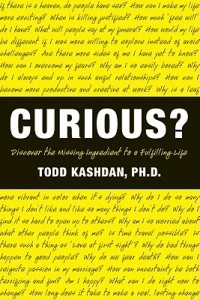 This is the time of year when the temptation to hibernate — physically and mentally — can hit hard. It's so much easier to stick with familiar and comforting routines, to trundle along in the same old rut.
This is the time of year when the temptation to hibernate — physically and mentally — can hit hard. It's so much easier to stick with familiar and comforting routines, to trundle along in the same old rut.
I asked clinical psychologist and George Mason University scholar Todd Kashdan – author of Curious? Discover the Missing Ingredient to a Fulfilling Life (Buy it at Amazon, Barnes & Noble, Borders, or Indie Bound) — if he'd share some tips for how to refresh our personal and professional outlook.
Here's Todd's advice, based on some of the research he's done in his lab:
"1. Thrive on uncertainty. We rarely look forward to the tension that accompanies uncertainty, but research shows that these feelings lead to the most intense and longest-lasting positive experiences. New and uncertain activities make people happier and create more meaning than familiar routines. Re-train your brain to benefit from the pleasures of surprise and uncertainty. And do the same for people around you. For instance, every week, give a free lunch away to someone who best embodies a strength valued by the business (Compassion? Leadership? Gratitude? Humor?). Let the person who wins pick a lunchmate whom they don't know as well as they should. Use the pleasures of uncertainty to build satisfaction and commitment inside your organization.
"2. Find the unfamiliar in the familiar. As soon as we think we're experts, we stop paying attention and start falling back on scripts, labels, and categories. That's especially true in the workplace. Yet scientists have discovered the value of attending to what we don't know about people and how they differ from us — instead of relying on what we already know and how they are similar to us. Encourage your team to make this mindset switch. You'll develop stronger bonds, squelch prejudice, and help your star players avoid being blinded by their expertise. For instance, when you go out to lunch with colleagues, ask them about something that interests you but that you never talk about. What are their top 5 places to travel to in the world, and why? What movies do they like but are often embarrassed to share? And don't always spend your time with people you know. Seek out strangers at work who intrigue you, who are different from you, and who expand your horizons.
"3. Be a safe haven for the risks and joys of others. To take risks and experiment with new ways of thinking and acting, we need to feel secure. If you want workers to be creative, be responsive when they share past explorations or future plans. If they feel uncomfortable, let them know that anxiety is natural when trying new things. Share a story of how the last time you felt anxiety and self-doubt. You might be surprised how comfortable it will make them to take on tough challenges. And respond genuinely when they share what is intriguing and going right in their lives. Don't just ask, "How was your weekend?" Ask them what their peak moments were on Saturday and Sunday. And when they share, follow-up with questions, ask for details. You might become genuinely interested in their interests and create a safe haven for the sorts of breakthrough thinking that changes companies — and sometimes the world."
January 23, 2011
Factoids of the day: Game not over
 Lots of interesting factoids in this Wall Street Journal
Lots of interesting factoids in this Wall Street Journal
excerpt of Jane McGonigal's equally interesting book, Reality Is Broken: Why Games Make Us Better and How They Can Change the World. Here are a few (italics added):
Here are a few (italics added):
"[Al]though a typical gamer plays for just an hour or two a day, there are now more than five million 'extreme' gamers in the U.S. who play an average of 45 hours a week. To put this in perspective, the number of hours that gamers world-wide have spent playing "World of Warcraft" alone adds up to 5.93 million years."
"In a good game, we feel blissfully productive. We have clear goals and a sense of heroic purpose. More important,we're constantly able to see and feel the impact of our efforts on the virtual world around us. . . . One recent study found, for example, that players of 'Guitar Hero' are more likely to pick up a real guitar and learn how to play it."
"Research shows that gamers spend on average 80% of their time failing in game worlds, but instead of giving up, they stick with the difficult challenge and use the feedback of the game to get better."
"Studies show that we like and trust someone better after we play a game with them—even if they beat us. And we're more likely to help someone in real life after we've helped them in an online game. It's no wonder that 40% of all user time on Facebook is spent playing social games."
January 13, 2011
Ngram Faceoff: Profit and safety
Another Ngram Faceoff, this time between profit (red) and safety (blue) in American English between 1790 and 2010. (Click the chart to get a larger version.)
Granted, you can't put too much emphasis on the scientific bona fides of the Ngram analysis, as linguist Geoffrey Nunberg points out here, but here are some touchpoints in the history of safety you might find interesting:
1790: First U.S. patent issued.
1850: First accident insurance policy issued in the United States.
1911: Triangle Shirtwaist Factory fire.
1970: Passage of the Occupational Safety and Health Act (OSHA).
1972: Passage of the Consumers Product Safety Act (CPSA).
Safety fought a hard battle from 1900 to 1970, but since then things have been looking up. Or perhaps there's an alternative explanation: Maybe America has simply become a nation of wusses.
January 4, 2011
3 resolutions for making 2011 practically radical
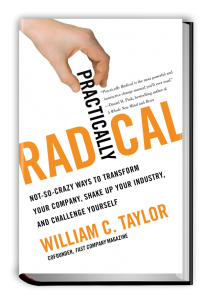 Still haven't gotten around to making your new year's resolutions? The Pink Blog is here to help.
Still haven't gotten around to making your new year's resolutions? The Pink Blog is here to help.
I asked my friend, Fast Company co-founder Bill Taylor, to do the work for us — and offer up a few resolutions to help us work better and innovate faster in 2011
The three suggestions listed below come from Bill's smart and energetic new book, Practically Radical: Not-so-crazy Ways to Transform Your Company, Shake Up Your Industry, and Challenge Yourself, which debuts today. (Buy it at Amazon, Barnes & Noble, Borders, 8CR, or Indie Bound).
So steal these resolutions. Then pick up a copy of Practically Radical for yourself for even more wisdom.
***
1. I resolve to help my organization (and me personally) become "the most of something" in my field. It's not good enough to be "pretty good" at everything. The most successful organizations (and people) are the most of something—the most elite, the most affordable, the most elaborate, the most approachable. For so long, companies were content operating in the middle of the road. Today, with so much change, so much pressure, so many new ways to do everything, the middle of the road has become to road to nowhere. What are you the most of?
2. I resolve to embrace a sense of vuja dé. We've all experienced déjà vu—looking at an unfamiliar situation and feeling like you've seen it before. Vuja dé is the flip side of that—looking at a familiar situation (an industry you've worked in for decades, problems you've worked on for years) as if you've never seen it before, and, with that fresh line of sight, developing a distinctive point of view on the future. The challenge for all of us is that too often, we let what we know limit what we can imagine. This is the year to face that challenge head-on.
3. I resolve to look for new ideas in new places. The more I study innovation, the less enamored I become of "benchmarking" the competition. What good is it to compare yourself against "best practice" in your field, especially if "best practice" isn't that great to begin with? The most creative leaders aspire to learn from people and organizations far outside their field as a way to shake things up and make real change. Strategies and practices that are routine in one industry can be revolutionary when they migrate to another field. Do you have new ideas about where to look for new ideas?
January 1, 2011
What's your sentence?: The video
On New Year's Day last year, we introduced our Two Sentences video. On New Year's Day this year, we introduce a new video inspired by its predecessor.
Over the past few months hundreds upon hundreds upon hundreds of Pink Blog readers and Pink Newsletter subscribers have sent us 15-second video clips answering the question: "What's Your Sentence?"
We watched every single one. Then we compiled about a dozen of them (spanning four continents!) into this two-minute video.
Of course, the volume of submissions meant that we couldn't include literally 99% of what we received. But to those of you who submitted, many thanks. (We'll be sending out some books as thank you gifts later this month.) And to those of you intrigued by this exercise, start 2011 right by taking some time today to ponder your own sentence.
Happy New Year!
P.S. If you'd like to share (the written version) of your own sentence, feel free to do that in Comments section. I'll repost the most intriguing ones — and even link back to your site if you'd like.
P.P.S. You can also watch the video on YouTube.


